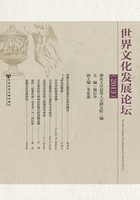
Cultural Soft Power
I am glad to attend this conference. Firstly, on behalf of contemporary culture society, I'd like to congratulate the opening of the first world culture development forum. Personally speaking, the forum is in due time, because culture becomes more and more important in contemporary world. There is a very important phrase—cultural soft power. The concept of cultural soft power is in fact a very obscure concept. As we know, we understand well the concept of hard power, such as economic power, military power, and political power etc. As to cultural soft power, what is its content? In other words, how should we define it? This is a very complex question. I will try my best to explain it. Firstly, I have to define the concept of cultural soft power. In my opinion, I consider cultural soft power as one kind of culture. To be specific, it refers to the attractiveness, emotional appeal, group cohesiveness, competitiveness, and influence expressed by one culture. The cultural soft power is embedded in the values, ideology, cultural tradition, policies and regulations, educational activities, the way of life, as well as cultural products and services. Cultural soft power has no fixed mode expressing its influence. An important way for cultural soft power to show its subtle influence is education and assimilation. What is cultural soft power? According to our research, we'd like to apply a quantifiable approach to understand it, in this sense; we suggest analyzing it from the perspective of structure and function. Roughly speaking, cultural soft power can be divided into the following several powers. The first one is the attractiveness of cultural value. The value of one culture reflects the interest and desire of relative cultural subjects, expresses the ideal and belief of them, and contains the overall blue print of the whole country. Therefore, it is the backbone of one country, the soul of one nation, the spiritual standpoint of the person involved. It is the essential part of the cultural system. On one hand, it is the power of education and passion; therefore the whole nation could have consensus to the common ideal proposed by the culture. It is the presupposition and basis for the nation to live together. On the other hand, it is the unique attraction recognized by other nations with its advanced spirit, rich contents, and inner charm. The cultural values in the world are always in the pattern of diversity and competition in human history. Although cold war has finished, the history continues. The competition of different cultural values is more and more intense. The input and output of values become the competitive stage for different cultural values. How to propose the universal values of democracy and human right distinguished from western ones? How to propose a national dream distinguished from American dream and eastern way of life? Which are the main tasks of China Dream? It is a challenge faced by contemporary Chinese culture. Secondly, I will discuss the creativity of cultural knowledge. Culture is neither born with nor a divine creation, but the practical product of the human being. The creativity of a culture is crucial to its soft power. The creativity of a culture is based on the production, spreading and application of knowledge. The knowledge production mainly depends on the academic research of natural and social science. The spread of knowledge depends mainly on education, mass media and the active learning of general public. The application of knowledge depends mainly on production research. The most important in the cultural production is to build a cultural system which encourages cultural creativity. Cultural creativity is an important factor which contributes to world culture and promotes national cultural production. Thirdly, I will discuss the competitiveness of cultural industry which is the connection between culture and economy. It covers a lot, including news service, book publication, copyright service, broadcasting, television, arts, internet cultural service, cultural leisure service, as well as the production and consumption of other cultural products. To some extend, it can be said that cultural values can be spread directly by cultural industry. The development of cultural industry has been the foundation of cultural competition. It has been an emerging industry in the information age with the characteristic of low-cost, high-output and great influence and has been an important force in economic development. For example, culture industry has become the number one industry leading the American economy in 1990s. It is very important for a country to own its independent intellectual property rights in international cultural competition. Fourthly, I will discuss the affinity of cultural service. It refers to the coverage ratio and quality of public cultural service. The right of culture is the innate basic right of the man. For some historical reasons, public cultural service has been not well developed in China, especially in the rural area. We should try to promote cultural service which is close to real life and ordinary public life. Finally, I think we should pay attention to cultural influence which is an important part in cultural soft power and cultural guide force for cultural system. All of the factors discussed above are very important for cultural soft power construction. We should respect our own cultural tradition and the diversity, as well as specific cultural needs while we construct our cultural soft power.
